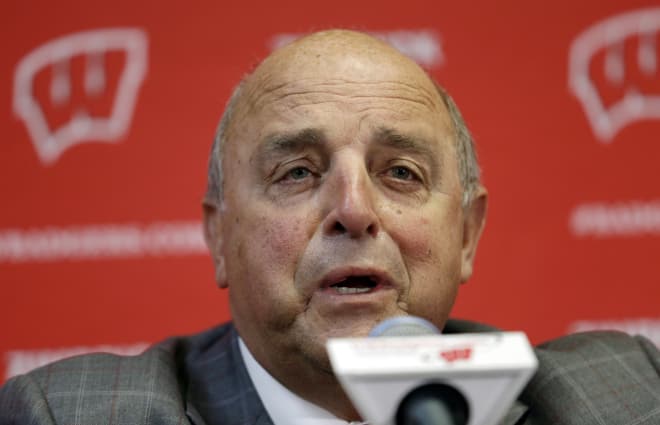While NU fights, rest of Big Ten falls in line with football postponement
Nebraska’s administration and head coach Scott Frost haven’t minced words regarding the Big Ten’s decision Tuesday to postpone its 2020 college football season to the spring.
The rest of the conference, however, seems to have fallen in line with the league’s plan.
Following Tuesday’s announcement, Ohio State athletic director Gene Smith, Wisconsin athletic director Barry Alvarez, and Purdue head coach Jeff Brohm all spoke with the Big Ten Network to give their thoughts on the situation.
In summary, all three expressed their disappointment in not having a fall season, but each agreed that it was the right move by the Big Ten.
“The decision’s made,” Alvarez told BTN. “No one likes it. But we’re in a pandemic, and it’s very difficult to play sports and have answers to these questions when your No. 1 concern is the health and safety of our student-athletes and everyone associated with the program. It’s how we respond to this. If we respond positively, let’s move forward.”

Smith echoed that sentiment, agreeing with Alvarez that one of the biggest issues in terms of controlling COVID-19 through a fall season was the inability for proper contact tracing, especially in a contact sport.
“We stand with the league,” Smith said. “We understand the medical advice that we had received. We were getting ready to put on pads, and that was a point, that was a moment, where the science began to become real. We support the fact that we needed to make a pause.”
Brohm admitted that he thought delaying the start of the season two weeks to the weekend of Sept. 26 could have provided more clarity to some key unknowns, but he too agreed that the Big Ten made the right call in the name of player safety.
“In the end, you have to go with what the medical experts say and what they’re telling our people,” Brohm said. “We had a whole task force of people, and while just as a coach not agreeing with the trainer or the doctor on your team sometimes, you have to, in the end, do what the league feels is responsible.
“So I’m not going to second-guess Commissioner (Kevin) Warren or our medical experts. Yes, I want to play football. Yes, I’m disappointed we’re not playing, and I wish we could play right now. For those that want to play football, moving forward from here, we’ve got to find a way to play in the spring, and I’m all for that.”
As far as the logistics involved in moving the season to the spring, there are plenty of questions and issues that will arise in that course as well.
Alvarez said Wisconsin head coach Paul Chryst told him about the difficulties in trying to play two seasons within one calendar year, something Chryst experienced first-hand during his lone season coaching in the World League.
Chryst’s World League players competed in a 10-game spring season, and some went on to join the NFL later that fall. The physical toll proved to be too much for many of those players to handle.
“(Chryst’s) opinion is if you’re going to do something in the spring, it has to be condensed,” Alvarez said. “Not near as many games as you would have in a normal season. Hopefully, if you do something like that and everything is cleared, you move forward into a normal season.”
As for the more immediate future, Brohm said Purdue’s plans going forward were still to be determined. He said there have been a lot of conversations about what the team should do next, but the Boilermakers did not have a definitive plan in place yet.
Alvarez revealed that Big Ten teams would be allowed 20 hours of practice time per week through the rest of the fall, which essentially continues the “enhanced training” model the NCAA implemented in July with its six-week preseason plan.
Of those 20 hours, eight would be for eight training and film, one for a daily walk-thru, one for daily meetings, and then two off days.
“I’m disappointed like everyone,” Brohm said. “I know our team was devastated today… In the end, we want to play football, so whenever that may be, we want to get it done.”
Smith said he met with student-athletes from all of Ohio State’s fall sports teams on Tuesday, and each meeting was as difficult as the next. However, he said his message for all was to not let this situation derail long-term goals, even though it may seem easier said than done at the moment.
“They have a lot of things to be thankful for,” Smith said. “So spend tonight to go through your depression and wake up tomorrow with a new passion and a new focus on how you’re going to attack today and attack the future. That’s life. That’s what you have to do.”
